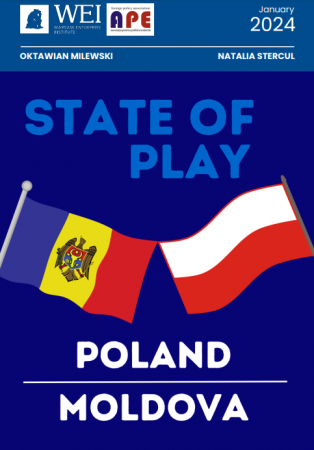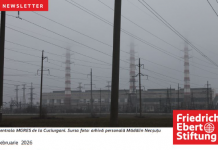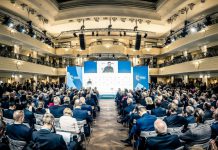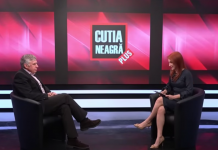The Warsaw Enterprise Institute presents „The State of the Game” – a series of publications on Poland’s economic cooperation with non-EU countries.
State of the Game publications are two-part. The first part presented the Polish perspective, and the second – thanks to cooperation with friendly foreign think-tanks (this time we cooperated with the Foreign Policy Association of the Republic of Moldova from Moldova, whose expert prepared the first part of this publication) – the perspective of the partner country.
State of Play: Poland – Moldova
Oktawian Milewski, Natalia Stercul
Source: https://wei.org.pl/en/2024/news/admin/report-state-of-play-poland-molodova/
The dynamics of bilateral relations between Poland and Moldova and the prospects for its intensification
Natalia STERCUL, Foreign Policy Association of the Republic of Moldova (APE)
The intensification of Moldovan-Polish political dialogue that has emerged in recent years is, to a large extent, thanks to the pro-European choice of Moldovan society. Moldova’s exit from international isolation, the activation of its foreign policy, and a significant improvement in the country’s image potential have driven a positive dynamic of cooperation with Poland and have allowed for a broader, more productive use of European mechanisms and instruments to enhance state interactions in various areas. This period can be considered one of the most productive for Moldovan-Polish cooperation, although it is burdened by the consequences of the war in Ukraine and potential risks to national and regional security. However, the potential for bilateral cooperation between the two states is far from fully realized and requires new approaches and systemic solutions to take trade, economic, and cultural-humanitarian potential to a new level.
Moldovan-Polish political dialogue in the thorny path of Moldova to the European model of development
The progressive evolution of Moldovan-Polish cooperation is largely due to the specifics of Poland’s foreign policy. The Eastern dimension of the foreign policy of the Republic of Poland has played and continues to play an important role for its external relations and for building a stable international environment. Due to this, Poland has actively used multilateral tools to promote the stable democratic development of the countries in the region. In particular, the Polish Aid program is an integral part of its foreign policy aimed at introducing effective principles and measures to consolidate the positions of the countries of the Eastern European region. The positive experience within the framework of the Visegrad Quartet on integration into the European community was quite pragmatically used by Poland in interacting with the countries of the region and helping to advance their European aspirations. This also applies to the Republic of Moldova, although the Moldovan-Polish cooperation has its own specificity, due in large part to the peculiarities of its domestic policy, its inconsistency and instability, which inevitably affected foreign policy aspirations. The long period of the so-called “balancing” between East and West slowed down the transformational processes in Moldova and created the prerequisites for a very tangible lag of the state’s development in comparison with its neighboring states.
Moldova’s thorny path towards the European development model, through the deepening of relations with the EU, also left its mark on the dynamics of Moldovan-Polish cooperation. The practical implementation of the Polish-Swedish initiative aimed at enlarging the eastern policy of the European Union was expressed in the development of multilateral cooperation between partner countries within the framework of the well-known and highly ambitious EU-Eastern Partnership project. The aim of the project was the political and economic integration of states through radical transformations and reforms aimed at improving the well-being of the participating countries and deepening their relations with the EU, as happened within the Visegrad Group. The Prague Summit of 2009 marked the beginning of these processes. For Moldova, this period coincided with the coming to power of the Alliance for European Integration. Despite the high level of conflict within the ruling coalition, its four-year period in power marked the beginning of profound changes in the relation between the Republic of Moldova and the EU. Participation in the Eastern Partnership project created an additional incentive to promote the European vector of Moldova. It has had a beneficial effect on Moldovan-Polish relations, which up to this time managed to build very strong diplomatic ties. In spite of the accumulation of a fairly solid international legal base of bilateral cooperation in various areas, the existing potential of cooperation had not been fully exploited.
Dynamics of bilateral dialogue in the context of Polish initiatives on cooperation and development assistance
In the period from 2009 to 2014, Poland, both independently and as part of the Visegrad Group, increases its influence in the region as a whole, and on Moldova in particular. Therefore, Poland begins to actively provide financial assistance through the implementation of integrated, systemic programs, projects and initiatives in various areas of life of the Republic of Moldova. The support of Poland and other EU member states has largely led to the development of Moldova’s European integration processes. The progressive promotion of promising cooperation between the Republic of Moldova and the EU has allowed Moldova to become the so-called “success story” among the Eastern Partnership countries. Meetings with representatives of the EU have become more frequent, as well as financial assistance from European partners, including from the International Monetary Fund and from a number of Western countries, including Poland.
A more intense phase of Moldovan-Polish relations began, which led to the establishment of the office of the International Solidarity Fund “Information Center for Local Authorities of Moldova”. Its activities were aimed at promoting the development of the state by providing solutions in the field of local development, including the establishment of trust relations between the two banks of the Dniester and the resolution of the Transnistrian conflict. In addition, Polish initiatives in the field of public security and border management were implemented, assistance was provided to the development of the Moldovan border police and the introduction of crime prevention and security measures. Largely thanks to the cooperation of the Fund of International Solidarity with the funds EuropeAid, USAID, UNDP, local action groups dealing with territorial development issues started to be created. Positive trends in Moldova’s development and the process of European integration have gained momentum.
The 2013 Vilnius Eastern Partnership Summit split Moldova’s life into “before” and “after”. Since April 28, 2014, citizens of the Republic of Moldova with biometric passports have been granted the right to visa-free entry into the Schengen area. Moldova was the first state in the Eastern Partnership to meet all the criteria of the Visa Liberalisation Action Plan. On June 27, 2014 in Brussels, the Republic of Moldova signed the Association Agreement with the EU and DCFTA, which became a stabilising factor for Moldovan policy.
At the same time, it should be noted that from the moment of political negotiations to the signing of the Association Agreement, the Republic of Moldova has experienced a difficult period of implementation of institutional reforms and introduction of legislative changes that brought Moldova closer to the institutional requirements and standards of the EU. This was largely due to the active involvement of European officials in Moldovan politics and the continuous financial and technical assistance from European partners. It seemed that the progressive dynamics of European transformations were clear. However, gradual pragmatic progress along the path of European integration and the implementation of reforms was accompanied by a decorative demonstration of the results of democratic transformations and reforms. Behind the screen of modernisation were internal political strife and conflicts that undermined the value of the successes achieved. This was due to the specifics of the internal political situation that prevailed at that time in Moldova. Corruption in the highest echelons of power, the acclaimed “theft of a billion” replaced the “success story” by the reputational desecration of the Moldovan authorities and the undermining of trust. Moldova became known as the “captured state”. This led to a difficult period of interaction between Moldova and the EU. Financial assistance has been frozen, the level of trust from European partners has been reduced to zero. The Moldovan authorities needed to restore trust. The EU insisted on promoting a focused policy in addressing its challenges and focusing on the implementation of the Association Agreement and fulfilling its commitments. The victory of pro-Russian forces in 2016 did not contribute to this.
It should be noted that while Poland remained active in cooperation with Republic of Moldova during the period of successful European transformations, there is a certain decline in cooperation and bilateral dialogue by 2016. Nevertheless, the focus continued on regional development. The Ministry of Investment and Economic Development of the Republic of Poland, within the framework of the Polish Aid Program, has allocated funds for the preparation and implementation of the National Strategy for Regional Development for the period 2016-2020. Assistance was provided to the National Bureau of Statistics of Moldova in the implementation of European standards. In cooperation with the Ministry of Construction and Regional Development, system solutions were introduced in the field of urban development policy. The development of small businesses and the agricultural sector was promoted, with the main emphasis on the balanced use of natural resources. In 2018, the national network “Leader” was created – a tool of the EU for the development of agricultural territories and increasing their level of economic stability. With the assistance of Poland, the number of local action groups on territorial development issues has increased significantly.
The intensification of political dialogue between the countries is largely due to Poland’s support for Moldova’s pro-European aspirations and its closer cooperation with the EU. The Polish government welcomed the pro-European choice of Moldovan society and the coming to power of Maia Sandu. Moreover, this has generally contributed to Moldova’s exit from the international isolation in which the country remained throughout the period of the pro-Russian authorities, as well as to the activation of its foreign policy and a significant improvement in the image of the state. This led to the positive dynamics of cooperation with Poland and made it possible to productively use European mechanisms and tools to improve the interaction of states in various fields. This period can be called one of the most productive ones. The number of bilateral contacts, summits, as well as joint participation in various forums has increased significantly and is happening on a regular basis.
Russia’s full-scale war against Ukraine created preconditions for the aggravation of security concerns in the Black Sea region, the increase in the militarisation of states, and a significant decrease in economic activity as a result of military actions in the Black Sea. These were the reasons for the revision of the policy of European security and consolidation of the efforts of the countries of the civilised world in order to counter Russia’s actions. This led to the cohesion of the positions of Moldova and Poland in condemning Russia’s aggressive actions and pushed the countries to step up a range of efforts to counter hybrid war and the Kremlin’s actions aimed at undermining Moldova’s democratic processes and European integration. Cooperation in the field of security and defense, ensuring energy and information security, countering cyber attacks, become the defining areas of interaction of states in the current conditions. This is reflected both in Poland’s political support and in its financial and technical assistance to Moldova, which contributes to the concerted promotion of cooperation in various fields.
Increased cooperation in the field of national and regional security
In light of the war in Ukraine, the parties regularly meet at international platforms to discuss international support and military assistance to Ukraine. In 2023, Moldova and Poland participated in the Ramstein format, which gathered at the table 54 delegations from different countries; the Munich Security Conference, which brought together representatives of 150 countries; Poland was invited by Moldova to the second Summit of the European Political Community, held in the Republic of Moldova, where issues of support to Ukraine were also discussed; the Salsberg Summit; the Vilnius NATO Summit, the Three Seas Initiative Summit and other multilateral formats and meetings. All this contributes to the unity of a common vision of a shared European future.
Moldova’s rethinking of national security issues and the importance of building up defence capabilities, reforming the entire security sector and modernising the armed forces has not been overlooked by the Polish partners. Poland supports Moldova’s aspirations to rapprochement with NATO and reform of the security and defense sector in accordance with European standards.
The rapid increase in hybrid threats has led the countries to take a new look at this growing problem, which the Republic of Moldova is finding increasingly difficult to cope with, despite the assistance of European partners in this direction. Cyber threats are increasing, Moldova’s institutional strings are increasingly exposed to cyberattacks, and false calls with reports of mines and bombs have increased. In these difficult conditions, Poland supports Moldova, in particular, in April 2023, the Prime Ministers of Moldova and Poland signed a Memorandum of Cooperation in the field of cybersecurity.
In general, the political dialogue of Moldovan-Polish relations from the moment of establishment of diplomatic relations up to the present period reflects more than 19 visits at the level of heads of state; 19 meetings at the level of heads of government; 26 visits at the level of the Ministry of Foreign Affairs; more than 15 meetings at the legislative level.
The current stage of bilateral relations between the Republic of Moldova and Poland is characterised by a stable pragmatic dialogue, supported by Poland’s political support for the reforms and fulfilling the conditions of the European Commission for the start of the negotiation process on Moldova’s accession to the EU. At the same time, the strengthening of relations is observed not only in the political sphere, but affects virtually all spheres of life of the state and society. Poland expressed its readiness to provide the necessary expertise to achieve Moldova’s full EU membership both bilaterally and through relevant European mechanisms and instruments. This commitment is enshrined in the joint declaration of the Parliamentary Assembly of Poland and Moldova, signed on 29 May 2023 in Warsaw. In particular, it notes that “the early opening of the negotiation process on accession to the EU will ensure the irreversibility of the European course of the Republic of Moldova and give a long-term systemic impetus to reforms.”
Trade, economic and energy cooperation
The Republic of Poland is among the top ten economic partners of the Republic of Moldova. In 2022, Poland ranked 8th in the list of countries to which Moldova exports goods with a total amount of USD 122.5 million or 2.8 % of the country’s total exports, and the 8th place in the list of countries where Moldova imports products with a total amount of USD 302.8 million or 3.3 % of the country’s total imported goods. If we make a comparative analysis with previous periods, we can trace the systematic growth and strengthening of Moldovan-Polish economic relations. In 2005, exports to Poland amounted to USD 25 million, in 2010 – 46 million, in 2015 – 68 million, in 2020 – 109 million and in 2022 – USD 122.5 million. This trend is also observed with regard to the import of Polish products. In 2005 – 65 million, in 2010 – 105 million, in 2015 – 122 million in 2020 – 217 million, and in 2022 – USD 302.8 million. Stable growth of economic relations demonstrates a high level of interstate relations. Among the largest Moldovan goods exported to Poland, the main place is given to wines and agro-food products, and among imports are technology, chemical products and household appliances.
According to the Ministry of Foreign Affairs and European Integration of the Republic of Moldova, in June 2022, more than 90 enterprises with Polish capital were registered in the country. The volume of investments amounted to about 11.5 million euros. In terms of invested capital, Poland ranks 22nd among the main foreign investors of the Republic of Moldova. Investments of more than USD 70 million come in areas such as finance, construction and the food industry. The largest Polish investors in the Republic of Moldova are “Moldova Zahar” SRL, “Polski Cukier”, “RedSky”, “ECM Group Polska” SA.
The Republic of Moldova and the Republic of Poland cooperate in the field of infrastructure development and urban development. For instance, in June 2023, the Minister of Infrastructure and Regional Development of Moldova visited Poland to exchange experience in the management and development of road infrastructure. During the visit, strategic planning, project financing, construction and maintenance of roads, as well as issues of investment in the road sector were discussed.
In order to support economic relations between the two countries, in Moldova, in 2019, an economic forum was held under the patronage of the Embassy of the Republic of Poland in Chisinau, the Center for Development and Entrepreneurship of Moldova-Poland (CDAMP), the Lower Silesian Voivodeship, the Technology Transfer Center in Wroclaw and the Chamber of Commerce and Industry of the Republic of Moldova. In April 2023, the second bilateral economic forum was organised by the Polish Investment and Trade Agency in partnership with the Embassy of the Republic of Poland in Chisinau and the Investment Agency of the Republic of Moldova. The activities planned within its framework were aimed at strengthening cooperation between the two states. The forum discussed issues of interaction in the sectors of renewable energy, road and rail infrastructure, as well as the agri-food sector. A special moment of the event was the signing of the Memorandum of Cooperation between the State Enterprise “Railway of Moldova” and the Chamber of Railway Equipment Manufacturers and Railway Service Providers in Poland – Memorandum on cooperation, exchange of information, development of joint research projects.
Despite the fact that Poland actively invests in the economy of Moldova and occupies a significant place among the main foreign investors in the country, yet trade and economic interaction can be significantly higher and include a wider range of goods and industries. Of course, the consequences of the war in Ukraine are imprinting both on the level of interaction and on the potential of undisclosed opportunities of trade, economics and logistics. The energy sector is extremely vulnerable in Moldova. The dependence on Russia, coupled with an understanding of the depth of vulnerability of Ukraine’s energy sector due to the destruction of the Ukrainian energy infrastructure by the Russian side and the constant energy blackmail of the Kremlin, led to the realisation of the need for greater practical inclusion in the issues of energy diversification and the search for acceptable options to precede everything on issues of valuable policy.
Since the outbreak of the war in Ukraine and the subsequent energy crisis, Moldova joined the EU program on financing projects in transport, energy and digital technologies in May 2023 and in May 2022 completed the process of synchronisation in the European power grid ENTSO-E (ENTSO-E – European network of transmission system operators). 39 members representing 35 countries are responsible for the safe and coordinated operation of Europe’s integrated electricity system, the largest interconnected power grid in the world.
In addition, at the Moldovan-Polish forum in 2023, strengthening cooperation in the field of renewable energy was also discussed. During the economic forum, a Memorandum of Cooperation was signed with the operator of the electricity market – JSC “Energocom”, the only authorised commodity exchange in Poland. The document opens up new opportunities for joint-stock company with state capital in order to adopt Polish experience and enter a new market. Also, within the framework of bilateral cooperation in the field of energy and energy efficiency, in June 2023, seminars were organised by the Energy Efficiency Agency with the support of the Embassy of Poland and the Ministries of Moldova and Poland. The main purpose of the activities is to support the development of renewable energy and energy efficiency in Moldova, based on Polish experience. Attention is paid to the solutions and experience of the Klaster project (development of dispersed energy in energy clusters), as well as the acceleration of Moldova’s integration into European structures in light of the ongoing energy transformation. An important role is given to the promotion of legislative solutions and business models in the field of renewable energy and energy efficiency, including energy communities, which are both producers of goods/services and consumers, which includes renewable, green energy. In view of the acute shortage of specialists in the field of energy and policy in Moldova, the seminars are also aimed at training dozens of employees of central and local government in Moldova, mastering Poland’s best practices and experience in the field of energy efficiency and renewable energy sources. All this will ensure greater flexibility and versatility of the Moldovan energy sector and reduce the country’s energy dependence on the Russian Federation.
Priorities and Prospects of Bilateral Cooperation
The priorities of Moldovan-Polish cooperation will largely depend on three key factors:
- The position of Moldova itself, which has never actually considered Moldovan-Polish relations as a priority, despite their steadily positive dynamics. For Moldova, it is seen as promising to develop the Polish direction on a more systematic basis, incorporating unexplored areas and new prospective spheres into bilateral cooperation, taking into account the current state of national development and the European agenda of Moldova.
- The regional situation and the outcomes of the war in Ukraine, which will inevitably affect the subsequent interaction of regional countries, their security, and future development.
- The successful start and completion of Moldova’s negotiation process for EU accession.
The opportunities and potential of Polish-Moldovan bilateral cooperation have not been fully realized, requiring more comprehensive approaches to explore new directions of cooperation and increase trade turnover between the two countries. A more comprehensive approach is also needed for the development of the agricultural sector and the expansion of the range of Moldovan agricultural products supplied to European markets, including Poland. The development of the energy sector, logistics, and communication, as well as investments in new infrastructure projects, continues to be promising. The tourism sector remains underdeveloped. The development of new, more attractive tourism routes can become highly sought after.
Moldova’s greater involvement in Visegrad Group projects could also be significant for the development of the country’s cultural, scientific, and educational potential. In addition, the implementation of modern IT technologies in the educational process and the enhancement of computer literacy among teaching staff and students, especially in rural areas, are deemed important. Support from Poland is crucial for Moldova, and it can become more diversified, considering the accumulated experience and best practices, as well as expert and advisory assistance that Poland could provide on a permanent basis during Moldova’s transformative period, which awaits it after the start of the negotiation process on the path to EU accession.
Source: https://wei.org.pl/wp-content/uploads/2024/01/State-of-Play.-Poland%E2%80%93Moldova.pdf







